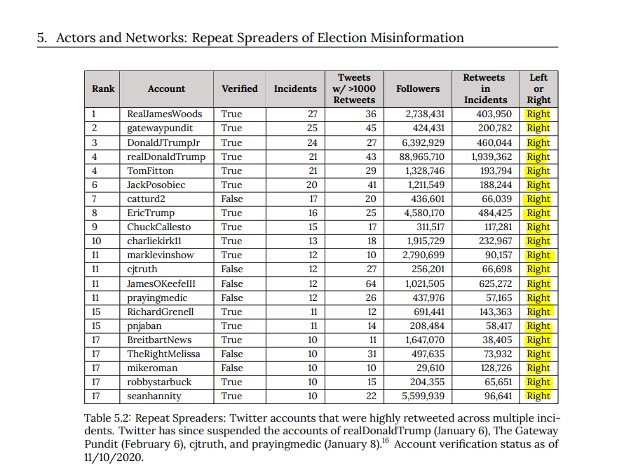TrueMedia, an AI watchdog partnered with Microsoft, claims to be a non-partisan outfit that informs the public and policymakers about the proliferation of AI deepfakes designed to mislead voters during elections. In a glowing New York Times profile earlier this year presenting him as a foremost expert on the topic, University of Washington professor Oren Etzioni warned that AI could unleash a “tsunami of misinformation” during elections.
Recent events suggest that claims about neutral, non-partisan expertise on “misinformation” should be approached with caution. As FFO exposed in an extensive report published in 2022, the ostensibly neutral election integrity partnership, created at the behest of DHS, played a pivotal role in ensuring the suppression of legitimate political discourse up to and around the 2020 election, with millions of posts throttled as a result of the EIP’s activities.
What’s more, the partnership’s activities were overwhelmingly partisan in its impact: every single social media account identified as a “repeat misinformation spreader” by EIP was associated with the political right.

The same cast of characters who played leading roles in the EIP have now attached themselves to TrueMedia, positioning themselves as experts on AI misinformation, just as the topic is set to explode in importance.
TrueMedia’s scientific advisory board currently includes:
- Jevin West, director of the Center for an Informed Public at the University of Washington, one of the four entities that made up the EIP
- Kate Starbird, co-founder of the Center for an Informed Public, the researcher who directed it during the height of its activities in 2020, and who has described the free marketplace of ideas as inherently “tilted in favor of misinformation.”
- Renée DiResta, research manager at the Stanford Internet Observatory while it was one of the four members of the EIP, and who, according to her then-colleague Alex Stamos, “worked for the CIA.”
- Darrel West, senior fellow at the Brookings Institution, who published a book titled who has complained that anti-censorship lawsuits and investigations by the House Judiciary Committee risked “turning disinformation into a constitutional right.”
TrueMedia’s Etzioni insisted, in a recent interview, that “Americans cannot figure this stuff out on their own,” implying the need for third-party experts such as TrueMedia to help them sort fact from fiction.
Microsoft: A history of Censorship and Misinformation
Microsoft, TrueMedia’s biggest partner in the tech sector, is keen to present itself as a good actor in this space, touting its efforts to combat AI deepfakes in elections around the world. Yet the tech giant’s record as a proactive opponent of “misinformation” is just as controversial as EIP’s.
Microsoft was the first major tech company to back NewsGuard, the “media reliability” watchdog that has become infamous for selling blacklists of disfavored news sites to the advertising industry in order to choke off their revenue. Far from combating misinformation, NewsGuard’s own founder has spread it himself, suggesting in 2020 that the New York Post’s Hunter Biden laptop story was a likely “hoax perpetrated by the Russians.”
Microsoft has been involved in other censorship controversies:
- Microsoft’s advertising and analytics subsidiary Xandr partnered with the Global Disinformation Index (GDI), a British nonprofit that maintained a secret blacklists of conservative news websites. Although Xandr suspended its relationship with GDI following media scrutiny, it remains tied to NewsGuard, which performs a comparable function.
- Microsoft was the only big tech company to endorse the Journalism Competition and Preservation Act (JCPA), a censorship industry-backed bill that would have forced tech platforms to favor establishment-friendly online media at the expense of their competitors.
- Microsoft worked with a Chinese military university on AI technology with applications for surveillance and censorship.
- A comparative study of search engines in China found that Microsoft’s Bing was more effective in restricting banned political and religious expression than its local Chinese competitors.
TrueMedia also received praise from Microsoft board member Reid Hoffman, whose company LinkedIn was acquired by Microsoft for $26.2bn in 2016.
Excited to see new technologies being created to help detect political deepfakes and ensure that our elections are free and fair. https://t.co/LdN69Neram
— Reid Hoffman (@reidhoffman) August 19, 2024
Hoffman has his own dismal track record on “disinformation,” independent of Microsoft’s. He admitted to funding “fake Twitter accounts with Russian-sounding names” during the 2017 Senate runoff election in Alabama, which resulted in a narrow loss for Republican candidate Roy Moore. The campaign’s own internal report described it as a “false flag” campaign to discredit the candidate.
Hoffman later apologized for his role in the Alabama false flag campaign, yet he continues to find himself embroiled in controversy over his extreme partisan comments – such as wishing Donald Trump was an “actual martyr.”
In July, his top political advisor emailed top national journalists arguing that the attempted assassination of Trump that month in Ohio “may have been staged,” describing it as a “classic Russian tactic.”





